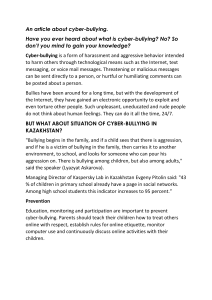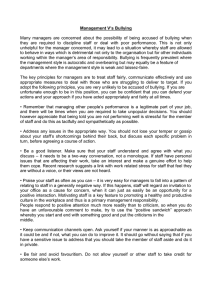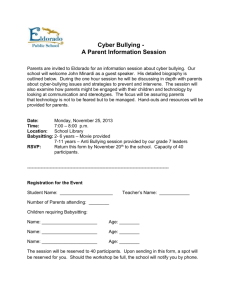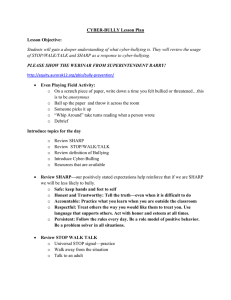Identifying and Understanding Relational Aggression and Cyber-Bullying
advertisement
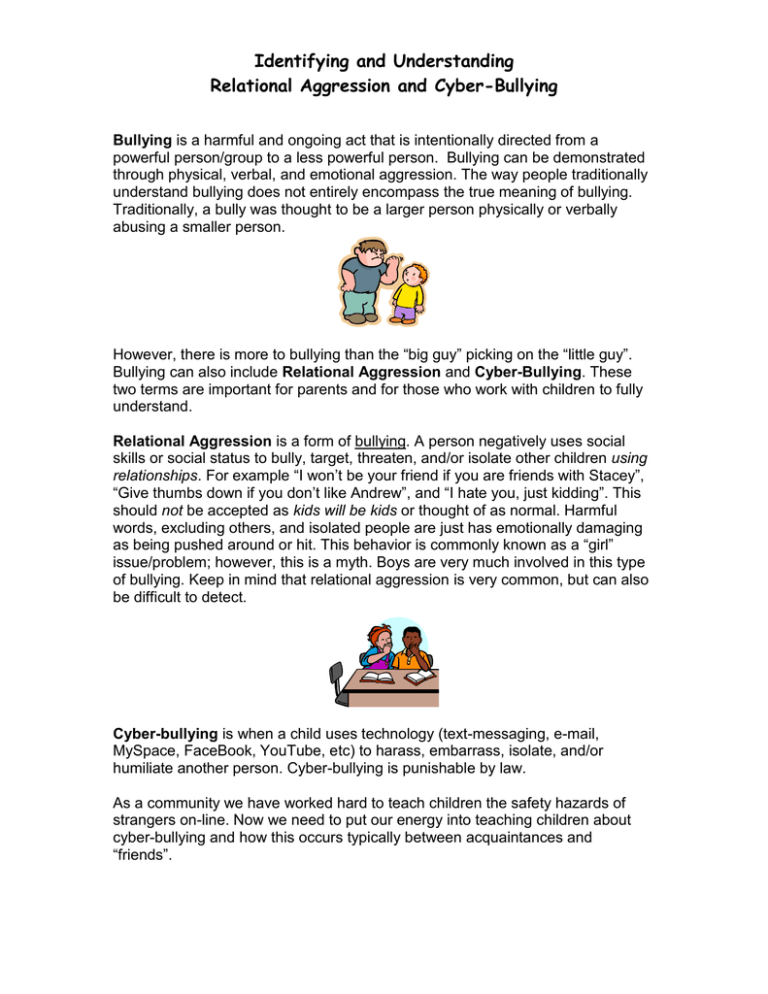
Identifying and Understanding Relational Aggression and Cyber-Bullying Bullying is a harmful and ongoing act that is intentionally directed from a powerful person/group to a less powerful person. Bullying can be demonstrated through physical, verbal, and emotional aggression. The way people traditionally understand bullying does not entirely encompass the true meaning of bullying. Traditionally, a bully was thought to be a larger person physically or verbally abusing a smaller person. However, there is more to bullying than the “big guy” picking on the “little guy”. Bullying can also include Relational Aggression and Cyber-Bullying. These two terms are important for parents and for those who work with children to fully understand. Relational Aggression is a form of bullying. A person negatively uses social skills or social status to bully, target, threaten, and/or isolate other children using relationships. For example “I won’t be your friend if you are friends with Stacey”, “Give thumbs down if you don’t like Andrew”, and “I hate you, just kidding”. This should not be accepted as kids will be kids or thought of as normal. Harmful words, excluding others, and isolated people are just has emotionally damaging as being pushed around or hit. This behavior is commonly known as a “girl” issue/problem; however, this is a myth. Boys are very much involved in this type of bullying. Keep in mind that relational aggression is very common, but can also be difficult to detect. Cyber-bullying is when a child uses technology (text-messaging, e-mail, MySpace, FaceBook, YouTube, etc) to harass, embarrass, isolate, and/or humiliate another person. Cyber-bullying is punishable by law. As a community we have worked hard to teach children the safety hazards of strangers on-line. Now we need to put our energy into teaching children about cyber-bullying and how this occurs typically between acquaintances and “friends”. What can you do about this? 1. TEACH children the importance of resolving conflict face to face. A strategy you can use at home that is taught in guidance lessons, individual counseling, and group counseling is the “I Statement”: I feel____ when you _____, so please___. This is difficult for children to express especially when it is much easier to use email/text/MySpace. When we use technology as a tool to help us resolve conflict we are missing an essential component - seeing and hearing the other person’s emotions. Not having this connection detaches children (and even adults) from the situation. (Have you even been guilty of sending off an angry email???) This allows people to say things they would not say in person. Therefore, to help children accomplish this goal, it is important to practice this strategy with them. You can model this strategy when a conflict comes up in your life to help children resolve a conflict appropriately. You can also role play various scenarios with children. 2. Take this seriously: Do not chalk up this behavior as “kids being kids”. If you see or hear relational aggression, INTERVENE. Tell the child who is demonstrating this behavior that it is not appropriate and will not be tolerated, followed by an explanation of the consequence. Compare the behavior to “traditional” bullying by helping the child understand this is unacceptable. Emphasize that leaving people out or using friendship as a weapon is as harmful as hitting someone and will not be tolerated. When talking to the victim of relational aggression, it is important to validate feelings by listening to the experience, talking about what he/she can do by asking questions such as: Is this a true friend if he/she treats you like this? What are you telling your friend/s about you when you continue to be friends with him/her even though you are treated this way? What would you like to be telling your friend about you? In the case of cyber-bullying, DO NOT answer texts or emails. You can report incidences to the police. If you are planning to report this to the police it is important to save the documentation to help the police. Also, stress that a derogatory written statement is considered a form of bullying even though it is not spoken. As parents it is essential to monitor the use of the computer and cell phones by limiting the amount of time they are used, have computers in a central location, and do not let your children sleep with phones nearby. In conclusion, bullying comes in various forms and can be hard to detect, but no matter how it is delivered the effects are always damaging. It is important to continue educating yourself on how to better serve the needs of children. If you still have concerns or questions, please contact your children’s guidance counselor for more information and resources. The more we work together as a team the better we can help the children.
